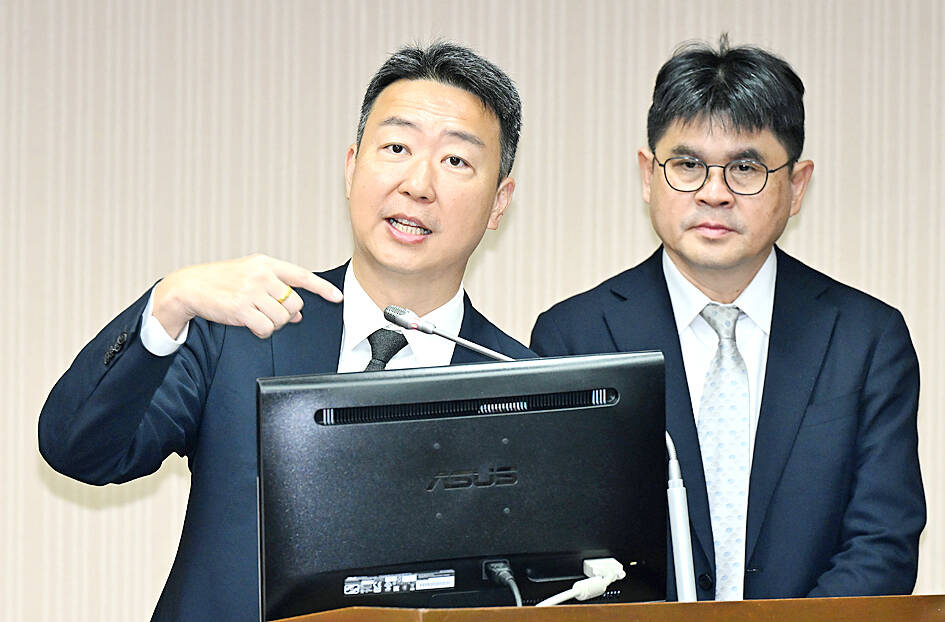Subsidies allocated to the six special municipalities for the construction of MRT systems would be reduced by NT$30.85 billion (US$1.01 billion) next year following the passage of amendments earlier this year, the Ministry of Transportation and Communications said yesterday.
The amendments to the Act Governing the Allocation of Government Revenues and Expenditures (財政收支劃分法), proposed by Chinese Nationalist Party (KMT) and Taiwan People’s Party lawmakers, would substantially increase government revenue allocated to local governments, while decreasing funds for the central government, Minister of Transportation and Communications Chen Shih-kai (陳世凱) told lawmakers at a meeting of the legislature’s Transportation Committee.
Subsidies that can be granted to local governments from the central government would decrease as a result, he said.

Photo: Liao Chen-huei, Taipei Times
The ministry initially budgeted NT$39.9 billion to subsidize the construction or expansion of MRT systems in Keelung and the six special municipalities, but the Executive Yuan only approved NT$9.05 billion, he said.
Railway construction projects proposed by Taiwan Railway Corp (TRC) and the Railway Bureau would also be affected by the amendments, according to the ministry’s budget plan next year.
TRC originally budgeted NT$21.25 billion for railway construction projects next year, but the amount approved by the Executive Yuan was NT$6.71 billion short. The budget for enhancing the safety of railway structures and the maintenance of trains was cut by about NT$2.95 billion.
The Railway Bureau planned to allocate NT$50.06 billion for railway construction projects, but is set to only receive NT$30 billion. Funding to electrify the dual railway tracks between Hualien and Taitung counties, and build an underground railway system in Taoyuan would be cut by about NT$16.9 billion.
The ministry has few resources to support infrastructure projects following the passage of the amendments, Chen said, adding that rules governing the distribution of subsidies have yet to be finalized.
“We would continue to review projects proposed by local governments. However, the amount of subsidies they receive each year would vary, depending on the government’s fiscal condition,” he said.
All Railway Bureau projects would proceed as scheduled based on contracts with construction firms, while budget plans would be compiled each fiscal year, bureau Director-General Yang Cheng-chun (楊正君) said.
TRC said its project to maintain trains and enhance railway structure safety is a multiyear plan, adding that more funding would be allocated in subsequent years should a shortfall occur this year.
The ministry said it would adjust subsidies proposed by local governments based on their respective needs, adding that it would also account for a locality’s financial soundness and the extent of MRT network development when deciding on the amount of subsidies to be allocated.
MRT systems fall under the jurisdiction of local governments, but the central government is obligated to provide subsidies to cover part of construction costs and to ensure that the systems deliver benefits from cross-regional connectivity, the ministry said.
Following the passage of the amendments, the funding local governments can access has vastly increased, and they should prioritize the needs of residents by budgeting appropriately for MRT and light rail systems, it added.

The manufacture of the remaining 28 M1A2T Abrams tanks Taiwan purchased from the US has recently been completed, and they are expected to be delivered within the next one to two months, a source said yesterday. The Ministry of National Defense is arranging cargo ships to transport the tanks to Taiwan as soon as possible, said the source, who is familiar with the matter. The estimated arrival time ranges from late this month to early next month, the source said. The 28 Abrams tanks make up the third and final batch of a total of 108 tanks, valued at about NT$40.5 billion

A group from the Taiwanese Designers in Australia association yesterday represented Taiwan at the Midsumma Pride March in Melbourne. The march, held in the St. Kilda suburb, is the city’s largest LGBTQIA+ parade and the flagship event of the annual Midsumma Festival. It attracted more than 45,000 spectators who supported the 400 groups and 10,000 marchers that participated this year, the association said. Taiwanese Designers said they organized a team to march for Taiwan this year, joining politicians, government agencies, professionals and community organizations in showing support for LGBTQIA+ people and diverse communities. As the first country in Asia to legalize same-sex

Travel agencies in Taiwan are working to secure alternative flights for travelers bound for New Zealand for the Lunar New Year holiday, as Air New Zealand workers are set to strike next week. The airline said that it has confirmed that the planned industrial action by its international wide-body cabin crew would go ahead on Thursday and Friday next week. While the Auckland-based carrier pledged to take reasonable measures to mitigate the impact of the workers’ strike, an Air New Zealand flight arriving at Taipei from Auckland on Thursday and another flight departing from Taipei for Auckland on Saturday would have to

MOTIVES QUESTIONED The PLA considers Xi’s policies toward Taiwan to be driven by personal considerations rather than military assessment, the Epoch Times reports Chinese President Xi Jinping’s (習近平) latest purge of the Chinese People’s Liberation Army (PLA) leadership might have been prompted by the military’s opposition to plans of invading Taiwan, the Epoch Times said. The Chinese military opposes waging war against Taiwan by a large consensus, putting it at odds with Xi’s vision, the Falun Gong-affiliated daily said in a report on Thursday, citing anonymous sources with insight into the PLA’s inner workings. The opposition is not the opinion of a few generals, but a widely shared view among the PLA cadre, the Epoch Times cited them as saying. “Chinese forces know full well that